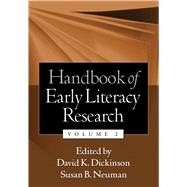Current research increasingly highlights the role of early literacy in young children's development--and informs practices and policies that promote success among diverse learners. The Handbook of Early Literacy Research presents cutting-edge knowledge on all aspects of literacy learning in the early years. Volume 2 provides additional perspectives on important topics covered in Volume 1 and addresses critical new topics: the transition to school, the teacher-child relationship, sociodramatic play, vocabulary development, neuroimaging work, Vygotskian theory, findings from international studies, and more.

Handbook of Early Literacy Research, Volume 2
by Dickinson, David K.; Neuman, Susan B.-

This Item Qualifies for Free Shipping!*
*Excludes marketplace orders.
Buy New
Rent Textbook
Rent Digital
Used Textbook
We're Sorry
Sold Out
How Marketplace Works:
- This item is offered by an independent seller and not shipped from our warehouse
- Item details like edition and cover design may differ from our description; see seller's comments before ordering.
- Sellers much confirm and ship within two business days; otherwise, the order will be cancelled and refunded.
- Marketplace purchases cannot be returned to eCampus.com. Contact the seller directly for inquiries; if no response within two days, contact customer service.
- Additional shipping costs apply to Marketplace purchases. Review shipping costs at checkout.
Summary
Author Biography
Susan B. Neuman, EdD, a professor in educational studies specializing in early literacy development, returned to the University of Michigan in 2004 after a 2-year hiatus, during which she served as the U.S. Assistant Secretary for Elementary and Secondary Education. Her research and teaching interests include early childhood policy, curriculum, and early reading instruction. In her role as Assistant Secretary, she established the Reading First program and the Early Reading First program, and was responsible for all activities in Title I of the Elementary and Secondary Education Act. Dr. Neuman recently received an honorary doctorate from the California State University-Hayward, where she also conducted her master's work in reading and curriculum. Widely published, she received her doctorate from the University of the Pacific in Stockton, California.
Table of Contents
| Introduction | |
| Cognitive and Linguistic Building Blocks of Early Literacy Development | |
| A Window of Opportunity We Must Open to All: The Case for Preschool With High-Quality Support for Language and Literacy | |
| The Knowledge Gap: Implications for Early Education | |
| Vocabulary Development and Instruction: A Prerequisite for School Learning | |
| Literacy Development: Insights from Research on Skilled Reading | |
| Neurobiological Investigations of Skilled and Impaired Reading | |
| Phonemic Awareness and Letter Knowledge | |
| Conceptualizing Phonological Processing Skills in Prereaders | |
| The Development of Phonological Sensitivity | |
| Phonemic Awareness and Reading: Beyond the Growth of Initial Reading Accuracy | |
| The Roots of Learning to Read and Write: Acquisition of Letters and Phonemic Awareness | |
| Families and Relationships: Socioemotional and Linguistic Supports | |
| The Influence of Parenting on Emerging Literacy Skills | |
| Teacher-Child Relationships in Early Literacy | |
| Environmental Supports for Language Acquisition | |
| The Misunderstood Giant: On the Predictive Role of Early Vocabulary to Future Reading | |
| Cultural and Linguistic Diversity | |
| Effective Interventions for English Language Learners (Spanish-English) at Risk for Reading Difficulties | |
| Recent Research on the Language and Literacy Skills of African American Students in the Early Years | |
| Cultural Diversity in Early Literacy: Findings in Dutch Studies | |
| Considering Culture in Research-Based Interventions to Support Early Literacy | |
| Supporting Literacy in Preschool Classrooms | |
| Vygotskian Perspectives on Teaching and Learning Early Literacy | |
| Preschool Classroom Environments and the Quantity and Quality of Children's Literacy and Language Behaviors | |
| The Relationships between Sociodramatic Play and Literacy Development | |
| Encouraging Young Children's Language Interactions with Stories | |
| Early Literacy Policy and Pedagogy | |
| Programmatic Interventions During the Preschool Years | |
| Reading Ahead: Effective Interventions for Young Children's Early Literacy Development | |
| A Pediatric Approach to Early Literacy | |
| Emergent Literacy of Low-Income Children in Head Start: Relationships with Child and Family Characteristics, Program Factors, and Classroom Quality | |
| Toward Effective Primary Grade Instruction | |
| The Transition to School | |
| Table of Contents provided by Publisher. All Rights Reserved. |
An electronic version of this book is available through VitalSource.
This book is viewable on PC, Mac, iPhone, iPad, iPod Touch, and most smartphones.
By purchasing, you will be able to view this book online, as well as download it, for the chosen number of days.
Digital License
You are licensing a digital product for a set duration. Durations are set forth in the product description, with "Lifetime" typically meaning five (5) years of online access and permanent download to a supported device. All licenses are non-transferable.
More details can be found here.
A downloadable version of this book is available through the eCampus Reader or compatible Adobe readers.
Applications are available on iOS, Android, PC, Mac, and Windows Mobile platforms.
Please view the compatibility matrix prior to purchase.
